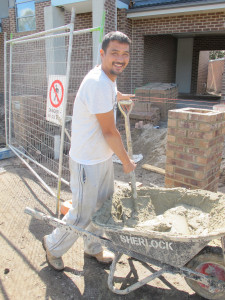Work rights a salvation for asylum seekers
Asylum seeker Hamid Ali rises at 5.30am each day and spends eight-to-ten hours laying bricks and pavers on suburban building sites.
It’s backbreaking work that many people would eschew. But Hamid couldn’t be happier.
After spending two years languishing on a bridging visa without work rights, the 32-year-old ethnic Hazara from Afghanistan is now able to support himself and send money home to his family thanks to being granted work rights two weeks ago.
“I am very happy to be off benefits and able to work and support myself,” he said this week after just two days on the job in Melbourne’s south east.
For two years all Hamid had in his life was a cage full of pet canaries to care for.
“Being stuck at home with nothing to do was really bad. It was very boring and I started getting really depressed,” said Hamid, who worked as a bricklayer in Pakistan before fleeing after being targeted by Islamic extremists.
“But now it is good. I can work – I can do something,” he said.
Hamid said he hoped to study for his builders licence and one day run his own construction company.
Hamid is a client of settlement agency AMES Australia, which has just over 7000 asylum seeker clients on its books in Melbourne.
Now around 2000 of these clients have work rights – up from around 350 in February.
Since May more than 150 asylum seekers have got jobs and there about as many more who have offers of work subject to them getting work rights.
AMES Australia CEO Cath Scarth says work is intrinsic to successful settlement.
“If there is one thing that we at AMES have learned in our more than 50 years of helping refugees and migrants settle in Australia, it’s that finding work is the single most important factor in successful settlement,” Ms Scarth said.
“Work is not just about a pay cheque, it is a source of pride, self-reliance, improved health and sense of self-worth. It gives structure and meaning to people’s lives and it is the fabric from which our society is wrought.
“Aside from a weekly wage, work gives people a sense of engagement and belonging. This is especially important for people who have come to Australia to escape trauma, torture or conflict.
“Research shows that early support in finding a job for new arrivals in Australia capitalises on their inherent motivation to support themselves through work and can circumvent long-term welfare dependence.
“In our experience, people who have had the courage and determination to get themselves out of harm’s way and make their way to Australia – often via a perilous boat journey – are almost always driven to succeed, contribute and establish meaningful lives,” Ms Scarth said.
There is also a cost benefit to society in helping migrants and refugees find jobs. According to researcher David Hetherington getting one childless person into a $40,000 a year job creates a value of $46,000 a year, including $21,000 worth of public value.
Laurie Nowell
AMES Australia Senior Journalist













